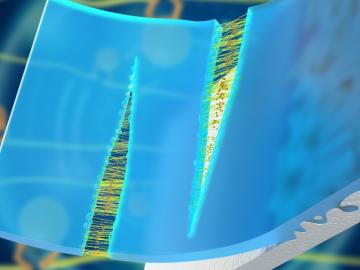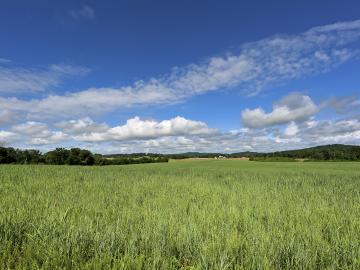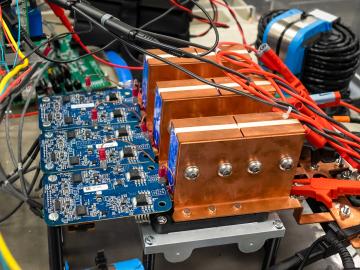
Filter News
Area of Research
- Advanced Manufacturing (2)
- Biology and Environment (19)
- Computer Science (1)
- Energy Science (32)
- Fuel Cycle Science and Technology (1)
- Fusion and Fission (10)
- Fusion Energy (1)
- Isotope Development and Production (1)
- Isotopes (3)
- Materials (16)
- Materials for Computing (1)
- National Security (12)
- Neutron Science (10)
- Nuclear Science and Technology (8)
- Sensors and Controls (1)
- Supercomputing (35)
News Type
News Topics
- (-) Advanced Reactors (12)
- (-) Artificial Intelligence (35)
- (-) Coronavirus (17)
- (-) Frontier (16)
- (-) Grid (16)
- (-) Nuclear Energy (28)
- (-) Security (12)
- 3-D Printing/Advanced Manufacturing (48)
- Big Data (8)
- Bioenergy (25)
- Biology (26)
- Biomedical (17)
- Biotechnology (10)
- Buildings (15)
- Chemical Sciences (35)
- Clean Water (2)
- Composites (12)
- Computer Science (63)
- Critical Materials (11)
- Cybersecurity (17)
- Education (3)
- Element Discovery (1)
- Energy Storage (43)
- Environment (38)
- Exascale Computing (13)
- Fossil Energy (1)
- Fusion (17)
- High-Performance Computing (32)
- Isotopes (20)
- ITER (2)
- Machine Learning (13)
- Materials (60)
- Materials Science (56)
- Mercury (2)
- Microelectronics (1)
- Microscopy (17)
- Molten Salt (3)
- Nanotechnology (29)
- National Security (18)
- Neutron Science (54)
- Partnerships (31)
- Physics (26)
- Polymers (13)
- Quantum Computing (13)
- Quantum Science (31)
- Simulation (10)
- Space Exploration (3)
- Statistics (1)
- Summit (22)
- Transportation (26)
Media Contacts

Research teams from the Department of Energy’s Oak Ridge National Laboratory and their technologies have received seven 2021 R&D 100 Awards, plus special recognition for a COVID-19-related project.

Nearly a billion acres of land in the United States is dedicated to agriculture, producing more than a trillion dollars of food products to feed the country and the world. Those same agricultural processes, however, also produced an estimated 700 million metric tons of carbon dioxide equivalent in 2018, according to the U.S. Department of Agriculture.

ORNL has licensed its wireless charging technology for electric vehicles to Brooklyn-based HEVO. The system provides the world’s highest power levels in the smallest package and could one day enable electric vehicles to be charged as they are driven at highway speeds.

A new tool that simulates the energy profile of every building in America will give homeowners, utilities and companies a quick way to determine energy use and cost-effective retrofits that can reduce energy and carbon emissions.

Kathy McCarthy, associate laboratory director for Fusion and Fission Energy and Science at the Department of Energy’s Oak Ridge National Laboratory, has been elected fellow of the American Nuclear Society for her nationally and internationally recognized leadership in nuclear energy and fusion.

The Department of Energy’s Oak Ridge National Laboratory has licensed its award-winning artificial intelligence software system, the Multinode Evolutionary Neural Networks for Deep Learning, to General Motors for use in vehicle technology and design.

The U.S. Department of Energy’s Innovative and Novel Computational Impact on Theory and Experiment, or INCITE, program is seeking proposals for high-impact, computationally intensive research campaigns in a broad array of science, engineering and computer science domains.

Scientists have found new, unexpected behaviors when SARS-CoV-2 – the virus that causes COVID-19 – encounters drugs known as inhibitors, which bind to certain components of the virus and block its ability to reproduce.

Thirty-two Oak Ridge National Laboratory employees were named among teams recognized by former DOE Secretary Dan Brouillette with Secretary’s Honor Awards as he completed his term. Four teams received new awards that reflect DOE responses to the coronavirus pandemic.

Three technologies developed by ORNL researchers have won National Technology Transfer Awards from the Federal Laboratory Consortium. One of the awards went to a team that adapted melt-blowing capabilities at DOE’s Carbon Fiber Technology Facility to enable the production of filter material for N95 masks in the fight against COVID-19.


